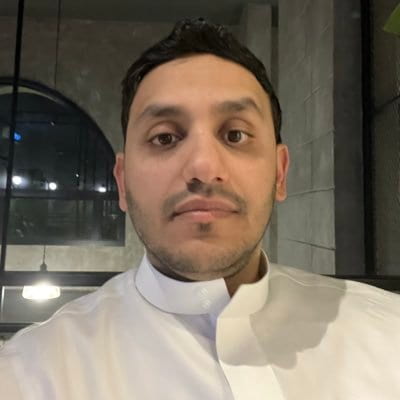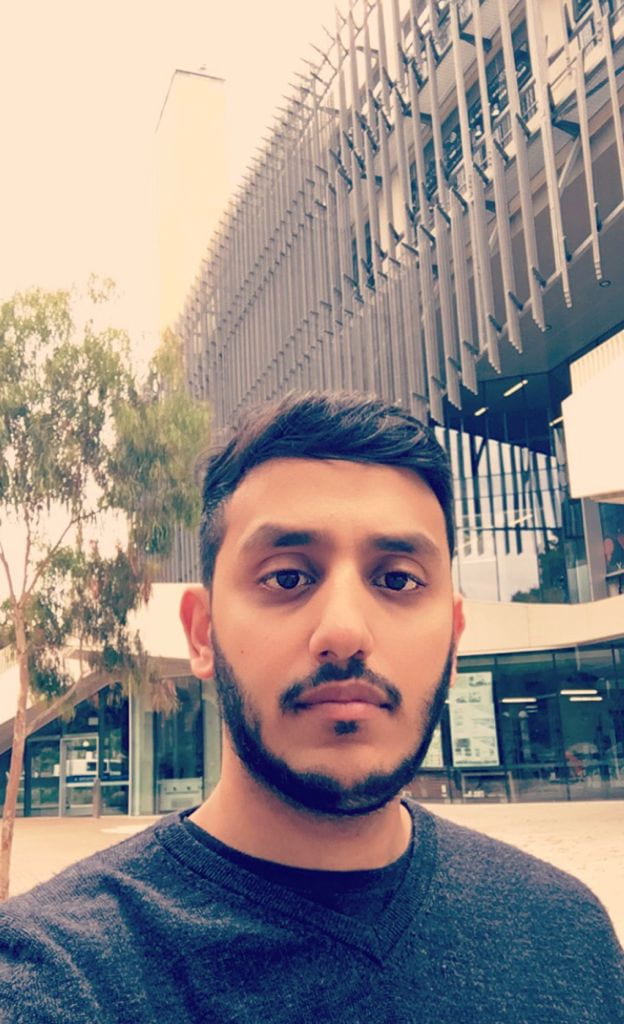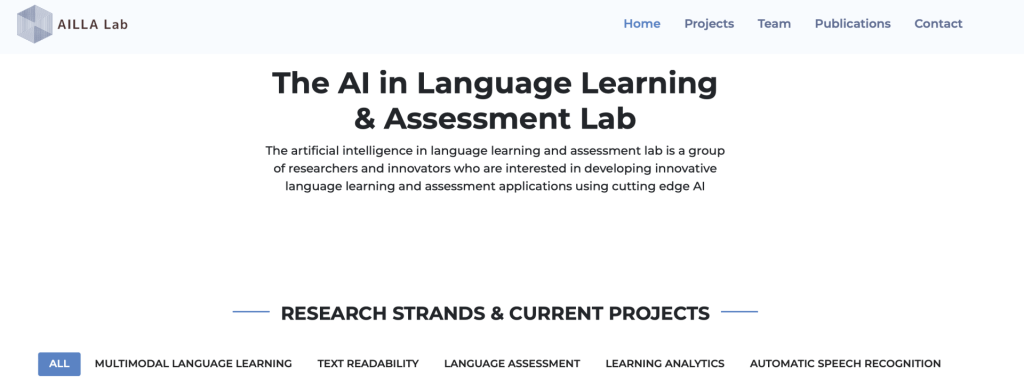
The power of collaboration: An interview with Emad A. Alghamdi, Assistant professor of computational linguistics at King Abdulaziz University
Rena Gao
Emad A. Alghamdi obtained his PhD in Linguistics at The University of Melbourne, and his PhD thesis was awarded as the University of Melbourne Chancellor’s Prize for excellence. During his study in Melbourne, he was a member of the HCI Interactive Technologies Lab (IxT) at the School of Computing and Information System. Now, he is an assistant professor of computational linguistics at King Abdulaziz University and leads the AILLA Lab. In this interview, Emad shared his experience with Rena as a successful researcher and his gain in collaboration with researchers in different fields.

Could you tell us a little bit about your background and your research interests for now?
I did my bachelor’s degree in English in 2008 and then I went to do a master’s degree in English linguistics, before I did another master’s in educational technology. After I graduated in 2013, I went back to my home country, Saudi Arabia, to teach at a university and do some research. After a while, I decided to do a PhD in linguistics, and I want to do computational linguistics so I just applied to do a PhD in linguistics and applied linguistics.
Regarding my research interest and career path, I was working as the founding director of a massive Open Online Courses Mook platform (KAUx) in my university before I joined The University of Melbourne, and my job was to design videos and take care of the development of video courses. Through this experience, I learned a lot about how to design effective videos for teaching purposes, and that’s got me some interest in videos as a technique or a pedagogical tool for teaching English as a second language.
I thought I’d like to do research in this area and then I met my supervisor, Paul Gruba.He told me he has been working in this area for 20 years, and it could be rather challenging. He mentioned that at that point, no one has really done research in this area and that intrigued me. Hence, I decided to conduct research in this area in relation to language assessment.
What do you think is your motivation to pursue this kind of research in such a different field, and what’s your motivation to embark on your current research focus?
It’s my own strong belief that research has to be multidisciplinary. No one can just excel in work without collaborating with other people from different fields. I have good training in linguistics, in second language acquisition, but my hobby is programming, and I learned this along the way. But again, I have to collaborate with other people from psychology, from human interaction, to understand their perspective on the subject matter that they’re trying to investigate.
And I think good ideas can come up with this kind of collaboration. Collaboration, especially among researchers, can sometimes lead to bigger success in a future research career.
What are some projects you are working on right now? As you mentioned, you are the leader of the AILLA lab, and what are other projects your labs are working on for now?
I founded the lab in 2022 right after I graduated in 2021.. The specific areas which I would like to integrate are Artificial Intelligence in language learning and assessment. The reasoning behind this is, of course, due my interest, also because there is a gap in this area in terms of research. One other reason is also because there are manyteams who are experts in various fields who want to work in this area.
Inthe first year, we had different teams, and we started with three teams. Eventually we started looking for funding from different organizations and agencies just for our research, and we’re lucky to secure some funding for most of our research projects. I think funding is a quite important thing, especially for earlier career researchers.

Have you ever encountered any difficulties undertaking such interdisciplinary research? For example, how do you situate yourself either to be a linguist or to be a computer scientist? And how could you actually find your place between the different fields?
Well, this is like the most challenging part of doing multiple works: You cannot belong to one particular ship alone. And sometimes, it’s challenging to talk to people who are really into their fields. Sometimes we don’t expect people to talk, or, you know, there’s some resistance from other people to talk to you.
One important point is to one is to be able to communicate well with other people. It’s like another language. You have to learn how to communicate with other people and how to deliver your ideas. Your understanding of the problem and communicating that understanding to them in the most effective way is challenging as well.
Sometimes, it’s difficult to understand their perspectives, how they came up with this idea, and why they are doing it this way. Soyou have to be able to work in a multidisciplinary area and at the same time acquire skills from doing so. Multidisciplinary work kind of connects the dots between the two fields and bridges the two fields together to come up with something interesting.
So what other difficulties have you encountered doing your own research, for example, to find collaborators who can understand linguistics and also have a background in further science? And after you identify the difficulties, how could you get the funding exactly to tackle your research questions, especially when you first started off?
Regarding the difficulty in the assessment of videos, it’s quite an interesting problem. And I remember I talked with my supervisor, who writes a lot about this, and we discussed many different ways on how to tackle this issue, how to solve this problem. One way that we talked about is how to analyze 6 very short videos, and qualitatively analysing every component of the videos in detail. Remember, videos are usually multimodal, and it’s sometimes interesting when you are doing linguistics. Some people may say that you’re not doing linguistics anymore because you’re focusing on visuals and it’s not linguistic anymore. That’s one of the things that have been mentioned to me many times: why did you analyze visuals, movement, or colours, this is not linguistics!
It was also challenging to read about theoretical and methodological concepts from different disciplines and try to understand how they analyze their videos. This can be found in fields like marketing education, psycholinguistics, linguistics, and second language acquisition, but also inscience and many, many other fields.
So there are many different perspectives. My goal was to understand all these perspectives and try to come up with some unified framework and then build the tools that can help researchers could use them on a large scale.
What do you think is the most important thing for you when you design your study? For example, do you think of it having a future application in the industry or for a bigger goalin language assessments or natural language processing?
Well, if you are talking about videos, I think videos have been around for quite a long time. Research-wise, people are afraid of videos because of the visuals and the relationship between all the different components and how they relate to each other. Another thing is that video is not like text. You cannot manipulate it easily, cannot change small parts of videos as in writing text.
But now, with the development of AI, it can create videos. Basically, AI makes it easier for people to create videos on a larger scale for language learning purposes and for assessment. I’m not looking at videos because it’s really hard to deal with and it’s kind of expensive to work with. But now, I think in the next couple of years, videos will be integrated into language assessment and language teaching as well.
Totally agree. I had the exact same feeling when I was doing and designing my own study, because from my study, it was like doing and designing an automatic assessment tool for assessing interactional competence in speaking. While we’re designing the framework, I feel like it’s really hard to include a lot of such features with the machine learning metrics and the models because no one has done such things in the machine learning or the natural language processing field before. But it’s important for us to actually bring our perspective as a linguist into the model, so I totally agree. So, have you ever done any work, for example, internships during your PhD as a scientist in computer science or in data science?
Yes, I did an internship in the MDAP Data Platform. I worked with researchers from the platform to apply NLP to text and generalize the features behind or in the text and also do some work on weak supervision while applying weak supervision on the text. It was really quite an interesting experience, and I learned a lot from collaborating with other researchers in the field. We especially had an engineering researcher and also other researchers from humanities and others from computer sciences as well.
What do you think is the biggest difference in experience when you were doing an internship compared with doing research?
You have freedom when you do your own research. I mean, during the internship, it’s not your research anymore. You will learn how to be a part of the team, and it’s sometimes not your idea that isbeing implemented, but you contribute to the discussion, and that’s teamwork. Other researchers have their own ideas of things and how to work, and how the world is functioning, but you know you have to come up with your own ideas and try to understand and be the middleman among those fields.
Do you think that the internship experience helped you to establish your future career, especially when you become a leader in the lab? Do you think that experience contributes to your later success?
Yes, I think the experience I gained from the University of Melbourne was to be able to work with other people to attend other courses. Because the school environment encourages that, we can communicate with other people from other fields easily, and that helped me a lot in thinking about different problems to investigate. Those conversations ahelped me to establish my lab, having people in my lab that are not in a single field but from other fields as well.
Considering the process, the first thing I think is to define the problem itself. The second point is to listen to other people – listen and try to find what they are trying to say and try to accept their view of the problem and how they are going to solve it. Ultimately, we can all sit together and discuss different resolutions.
So it’s a really flexible environment as we learn to accept each other’s ideas. We do have one particular way of doing things, but we complete our tasks in different ways. And when I was collaborating with other researchers from linguistics, I realized the hardest part was to explain why the computer science product actually worked and how the matrix worked in the experiment. So I think it’s really hard to communicate to people in a certain field, especially when they are not from the same field.
Do you have like any advice for the earlier career researchers or the PhD students if they want to pursue their future, for example, their future career in academia?
Yes, I recommend people to collaborate and talk to other people from other disciplines, and open their minds to other ideas and other perspectives. We are usually trained to think of something in a particular way, but it’s really good to keep an open mind to other different ideas from other disciplines and try to collaborate and talk to other people from other disciplines.
After the interview with Emad, I realised how important it is to collaborate, or to learn the collaboration with researchers beyond our own discipline. There’s no solo success, either in life or research.